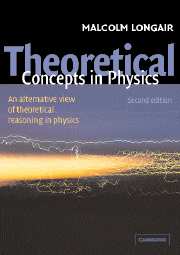Book contents
- Frontmatter
- Contents
- Preface and acknowledgements
- 1 Introduction
- Case Study I The origins of Newton's laws of motion and of gravity
- 2 From Ptolemy to Kepler – the Copernican revolution
- 3 Galileo and the nature of the physical sciences
- 4 Newton and the law of gravity
- Case Study II Maxwell's equations
- Case Study III Mechanics and dynamics – linear and non-linear
- Case Study IV Thermodynamics and statistical physics
- Case Study V The origins of the concept of quanta
- Case Study VI Special relativity
- Case Study VII General relativity and cosmology
- Index
3 - Galileo and the nature of the physical sciences
Published online by Cambridge University Press: 05 June 2012
- Frontmatter
- Contents
- Preface and acknowledgements
- 1 Introduction
- Case Study I The origins of Newton's laws of motion and of gravity
- 2 From Ptolemy to Kepler – the Copernican revolution
- 3 Galileo and the nature of the physical sciences
- 4 Newton and the law of gravity
- Case Study II Maxwell's equations
- Case Study III Mechanics and dynamics – linear and non-linear
- Case Study IV Thermodynamics and statistical physics
- Case Study V The origins of the concept of quanta
- Case Study VI Special relativity
- Case Study VII General relativity and cosmology
- Index
Summary
Introduction
There are three separate but linked stories to be told. The first concerns Galileo as natural philosopher. Unlike Tycho Brahe the observer and Kepler the mathematician, Galileo was an experimental physicist whose prime concern was understanding the laws of nature in quantitative terms, from his earliest writings to his final great treatise Discourse and Mathematical Demonstrations concerning Two New Sciences.
The second story is astronomical, and occupies a relatively small, but crucial, period of Galileo's career, from 1609 to 1612, during which time he made a number of fundamental astronomical discoveries which had a direct impact upon his understanding of the physics of motion.
The third story, and the most famous of all, is his trial and subsequent house arrest, which continues to be the subject of considerable controversy. The scientific aspects of his censure and subsequent trial are of the greatest interest and strike right at the heart of the nature of the physical sciences. The widespread view is to regard Galileo as the hero and the Catholic Church as the villain of the piece, a source of conservative reaction and bigoted authority. From the methodological point of view Galileo made an logical error, but the church authorities made a much more disastrous blunder, which has resonated through science and religion ever since, and which was only officially acknowledged by Pope John Paul II in the 1980s.
My reasons for devoting a whole chapter to Galileo, his science and his tribulations are that it is a story which needs to be better known and which has resonances for the way in which physics as a scientific discipline is carried out today.
- Type
- Chapter
- Information
- Theoretical Concepts in PhysicsAn Alternative View of Theoretical Reasoning in Physics, pp. 34 - 52Publisher: Cambridge University PressPrint publication year: 2003



